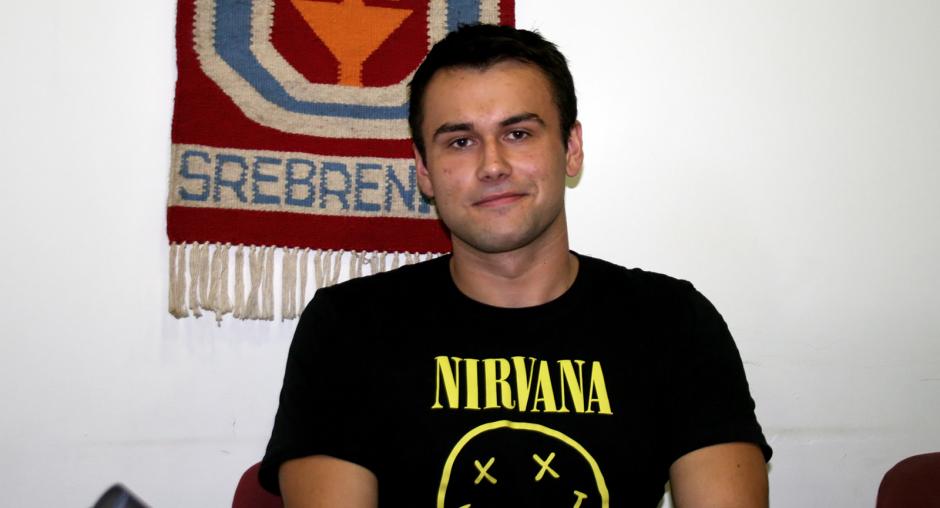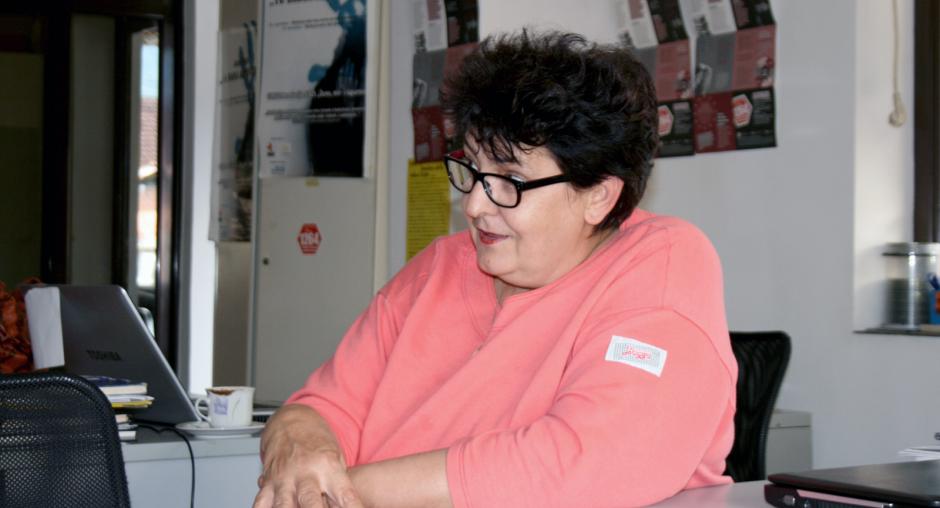Bosnia and Herzegovina: Life Beyond Politics - Tolerance Upfront
Vandalism, the violation of sacred objects and hate graffiti are the most commonly used methods for committing bias-motivated crimes in small and rural areas of the municipality of Bratunac in eastern Bosnia and Herzegovina, home to approximately 20,000 Serbs and Bosniaks. The desecration of Bosniak headstones at the Veljaci cemetery in Bratunac and offensive anti-Serb graffiti spray-painted recently on the wall of a Serbian Orthodox church in Konjevic Polje are just two examples.
Ifeta Merjemic, a returnee from Konjevic Polje, says this is not the first time a hate incident has occurred in her community and she suspects it was the act of an outsider, perhaps someone from the diaspora who visited briefly during the summer. “They plant a seed of hate and then they go, leaving us to deal with the consequences,” says Ifeta. However, because of the reaction that followed – repainting the wall and the public condemnation of the act – it did not damage the progress achieved in the community thus far.
Business and Co-operation Make a Difference
Ifeta never dreamed of running a successful poultry farm business when she returned to Konjevic Polje in 2000. For her, putting food on the table was far more important than renovating the family home destroyed during the war. Along with other successful women farmers, she formed the “Jadar” Association of Women, an organization that promotes tolerance among women of all ethnicities in this region and helps them become entrepreneurs.
Once a week, for two consecutive years, “Jadar” held workshops for Bosniak women from Konjevic Polje and Serb women from the neighbouring village Kravica. “The first time they came, they were a bundle of nerves,” remembers Ifeta. “But, we persisted and after long talks and hard work we managed to break all the barriers. Today, we go to one others’ houses, celebrate Christmas and Bajram (Eid) together, and even our children go to high school together,” adds Ifeta.
Together for Tolerance
Ifeta’s association is a member of the coalition against hate called “Together for Tolerance,” which is part of the Super Citizens in Action Initiative launched by the OSCE Mission to Bosnia and Herzegovina in 2013. Another member of the coalition that condemned the hate graffiti was the Women’s Forum from Bratunac.
The Women’s Forum is the very first non-governmental organization founded in Bratunac, in 1999. It helped set up other organizations in the region including “Jadar,” and while all of them have different focuses, together they are making a significant impact on the local community. Co-operation between the non-governmental sector and local authorities is the way to go, according to Stanojka Tesic, the Forum’s President.
She says the local community alone cannot prevent bias-motivated incidents. “This is where we serve as partners to every institution from the local to the State level so we are able to fully realize the rights that belong to us, such as the freedom of movement and the honouring of war victims,” adds Stanojka.
“Until five years ago, we used to have provocations, especially around the genocide commemorations in July,” says Stanojka. What these troublemaking informal groups and individuals do not realize is that, for people of Bratunac, life goes on beyond July 11 as well July 12, which honours the Serb victims killed in the war. “Already on July 13, we go back to our everyday lives. This is something we hold against everyone who does not live here, but rather waltzes in and provokes. It is not fair to all the hard work we all invest here,” she points out.
With the Security Forum that was established in 2004, local police, mayors, and municipal officials regularly discuss key security concerns in Bratunac with religious leaders, returnees and NGOs. The meetings provide an important venue for the exchange of relevant information about bias and hate incidents or crimes. “Safety is first and foremost. No one would want to come back if they were to constantly run into predicaments in the public sector, stores, schools or the health centre,” she says, estimating that, in her opinion, Bratunac has one of the highest numbers of returnees in BiH.
The Future Matters
Stanojka says that the people of Bratunac are working hard to bring back Bratunac to its pre-war condition. Creating an atmosphere of tolerance and coexistence requires confronting the past and looking ahead to a brighter future. “For some other generations this atmosphere is important, because it will encourage more people to come back. Although we are not a small municipality, young nor old people are leaving,” concludes Stanojka.
One of these young people who decided to stay in his home town in neighbouring Srebrenica is Bekir Halilovic, a second-year law student, a member of the Association “For Srebrenica”, and a co-ordinator of the “Rebel against Hate” coalition. The desire to change something in the town where everything stopped was what drew him to the civil society sector.
“We are changing this negative image of Srebrenica at the International Camp of Peace at Lake Perucac that celebrates its fifth anniversary this year,” says Bekir. He adds that Srebrenica has rich cultural and historic heritage to be proud of, and when young people from all over the region come to the camp, they get a different picture. “The picture they get is real, it is not ideal, but, it is real. We live in a society and a city that has a tragic past, but we are investing our best efforts into fighting for a future that does not have to be so tragic,” states Bekir.
As in the case of Bratunac and Konjevic Polje, problems arise around the time of commemorating the genocide. As a means to help strengthen community cohesion in Srebrenica, local authorities in 2014 developed an action plan for combating hate crimes. “We are one of the few municipalities that initiated adoption of such a plan, which goes to show that the local government wants to work on these issues,” says Bekir.
In addition, his organization holds workshops with high school students that encourage them to think about tolerance and coexistence. “These new generations born after the war do not know what war is. We hope that stories of those who know the horrors will not influence them,” says Bekir. He remembers provocations that came from his classmates ten years ago. Today, many cheer together when Bosnia and Herzegovina plays a soccer match.
The Solution is Simple
“We need to spend time with each other and get to know each other better. This is a solution. When you know people well enough then you try to be their friend and work with them. If anything, you do not stand in their way,” says Bekir.
The unavoidable fact is that provocative images, such as the one with the hate graffiti on the church wall in Konjevic Polje and the destroyed headstones in the Veljaci cemetery in Bratunac, seize the headlines. However, most of these incidents have no connection to reality, despite the shadow they cast on all the good work done by local governments and civil society organizations in overcoming each other’s differences and creating an environment where people of all ethnicities feel welcomed and safe.








